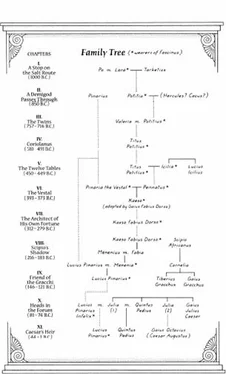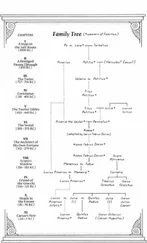Steven Saylor - Roma.The novel of ancient Rome
Здесь есть возможность читать онлайн «Steven Saylor - Roma.The novel of ancient Rome» весь текст электронной книги совершенно бесплатно (целиком полную версию без сокращений). В некоторых случаях можно слушать аудио, скачать через торрент в формате fb2 и присутствует краткое содержание. Жанр: Исторические приключения, на английском языке. Описание произведения, (предисловие) а так же отзывы посетителей доступны на портале библиотеки ЛибКат.
- Название:Roma.The novel of ancient Rome
- Автор:
- Жанр:
- Год:неизвестен
- ISBN:нет данных
- Рейтинг книги:5 / 5. Голосов: 1
-
Избранное:Добавить в избранное
- Отзывы:
-
Ваша оценка:
- 100
- 1
- 2
- 3
- 4
- 5
Roma.The novel of ancient Rome: краткое содержание, описание и аннотация
Предлагаем к чтению аннотацию, описание, краткое содержание или предисловие (зависит от того, что написал сам автор книги «Roma.The novel of ancient Rome»). Если вы не нашли необходимую информацию о книге — напишите в комментариях, мы постараемся отыскать её.
Roma.The novel of ancient Rome — читать онлайн бесплатно полную книгу (весь текст) целиком
Ниже представлен текст книги, разбитый по страницам. Система сохранения места последней прочитанной страницы, позволяет с удобством читать онлайн бесплатно книгу «Roma.The novel of ancient Rome», без необходимости каждый раз заново искать на чём Вы остановились. Поставьте закладку, и сможете в любой момент перейти на страницу, на которой закончили чтение.
Интервал:
Закладка:
The trading post was also a place to exchange news and gossip, to hear stories from faraway places, and to listen to traveling singers. Men who knew magic passed through, offering their services. Some could cure the sick or make a barren woman fertile. Some could see the future. Some could commune with the numina that animated the nonhuman realm.
By far the most exotic visitors to the settlement were the traders who arrived by boat, paddling upriver from the sea, where they arrived on larger ships, which they left moored at the mouth of the Tiber. Those huge, splendid ships-some of the settlers had once made a journey downriver to look at one-carried the traders up and down the coast and even, so they claimed, across the great sea. These seafarers called themselves Phoenicians. They spoke many languages, wore brightly colored clothes and finely wrought jewelry, and brought with them extraordinary things to barter, made in unimaginably distant lands, including small images of men, made of metal or clay. At first, misunderstanding, the settlers thought that numina lived in the images, just as numina lived inside trees and rocks, though the idea that a numen would reside in even the most splendid man-made object seemed to many of them far-fetched. The Phoenicians tried to explain that an idol did not house a numen, but stood as a representation of something called a god; but this concept was too abstract for the settlers to follow.
The latest descendent in the line of Po and Lara was a girl called Potitia, daughter of Potitius. Growing up at the trading post, Potitia had been allowed from earliest childhood to roam the surrounding countryside. For a long distance upriver and down, she knew every steep embankment and muddy beach along the riverbank. She had waded across the Tiber when it was low, and had swum across when it was high.
She had also explored the Spinon, which ran in front of the settlement, following it up through a little valley flanked by steep hillsides to its source, a marshy lake surrounded by hills. The marsh teemed with living creatures-frogs, lizards, dragonflies, spiders, snakes, and all sort of birds. It was exhilarating to see a flock of startled geese take flight from the reeds, or to watch the swans make circles in the sky before landing on the water with effortless grace.
As she grew older, Potitia’s explorations had taken her farther and farther from the settlement. One day, venturing upriver, she had discovered the hot springs. Greatly excited, she had run all the way home to tell the others, and was chagrined to learn that her father already knew about the springs. Where did the bubbling water come from? Potitius said it flowed up from a fiery place deep underground. Curious, Potitia had searched all around the hot springs for an entrance to the underworld, but had never found one. On one occasion, the hot springs dried up, but then returned. Alarmed that such a thing might happen again, the settlers decided to build an altar at the springs, and to make offerings to appease the fiery numina in the earth. Potitius had built the altar himself, using oxen to drag a large stone to the spot, then chiseling the stone into a shape that seemed suitable to him. Once a year, an offering of salt was spread upon the altar, then scattered over the hot springs. So far, they had not run dry again.
As her explorations took her outward from the village, so they also took her upward. The first of the Seven Hills which Potitia conquered was the one directly behind her family’s hut. On the side that faced the settlement, the hill presented a sheer cliff that was impossible for even the most determined child to climb, but on the far side of the hill, by trial and error, Potitia discovered a route that led all the way to the top. The view was astounding. Circling the crest of the summit she could look down on the marshy lake, on the settlement below, and on the region of the hot springs, which she now could see were situated at the edge of a large plain that lay in an elbow of the Tiber. Gazing beyond these familiar places, she realized that the world was much vaster than she had previously imagined. The river stretched on in either direction for as far as she could see. Wherever she looked, the impossibly distant horizon faded to a smudge of purple.
One by one, Potitia conquered all the Seven Hills. Most of them were bigger than the one closest to home, but were easier to climb, once you knew the best place to begin the ascent and which route to take. Each hill had something to distinguish it. One was covered with a beech forest, another was crowned with a ring of ancient oaks, another was populated by osier trees, and so on. The hills had not yet been given individual names. Collectively, for longer than anyone could remember, men called them the Seven Hills. More recently, a visitor passing through had jokingly referred to the region as the ruma, which was the same word men used to refer to a woman’s breasts, or the teats of a cow, and now, as often as not, ruma was the word people used for the hilly region. To the settlers, it seemed perfectly natural to liken the features of the earth to the parts of a body.
In a cliff directly across from the settlement, beyond the meadow on the far side of the Spinon, Potitia had discovered the cave. Situated in a cleft of the steep hill and concealed by scrubby bushes that clung tenaciously to the rocks, the mouth of the cave was hard to discern from the ground directly below; it might have been nothing more than a shadow cast by a lip of rock. Through trial and error, Potitia determined that it was impossible to climb down to the cave from above. Climbing up from the below would require considerable skill and daring. Her first few attempts over the course of a summer resulted in one nasty fall after another, and repeated scoldings from her mother, who disapproved of Potitia’s scraped hands, bloody knees, and torn tunics.
Eventually, Potitia discovered a way to reach the cave. When she stepped inside for the first time, she knew that all her efforts had been worthwhile. To a child’s eyes, the space seemed enormous, almost as big as her family’s hut. She sat upon an outcropping of rock that formed a natural bench, and rested her arm on a ledge that provided a shelf. The cave was like a house made of stone, just waiting for her to claim it. Unlike the hot springs, the cave was unknown to the others at the settlement. Potitia was the first human being ever to set foot in it.
The cave became her secret haven. On hot summer days she escaped there to take a nap. On wet winter days she sat inside, comfortable and dry, and listened to the rain.
As Potitia grew older, roaming the woods and exploring the ruma grew less important to her. She became more interested in learning the skills her mother could teach her, such as cooking and weaving baskets from the reeds that grew around the marsh. Her mother told her that she should begin to consider which of the boys in the settlement she might wish to marry; by various signs, Potitia’s body had begun to manifest the advent of her womanhood.
To celebrate her maturity, Potitia’s father gave her a precious gift. It was an amulet made of the yellow metal called gold.
For ten generations, the lump of gold which Tarketios had given to Lara had been left in its natural state; nothing had been fashioned from it, for the metal seemed too soft to be properly worked. It was a visiting Phoenician who had shown Potitia’s grandfather that gold could be alloyed with another precious metal called silver, and for a great price the Phoenician smith had crafted the resulting ingot into a shape specified by Potitia’s grandfather. By the highest Phoenician standards, the workmanship of the amulet was crude, but to Potitia’s eyes, it was a thing of wonder. Made to be hung upon a leather necklace, the little amulet was in the shape of a winged phallus. Her father called it Fascinus-bringer of fertility, protector of women and infants in childbirth, guardian against the evil eye.
Читать дальшеИнтервал:
Закладка:
Похожие книги на «Roma.The novel of ancient Rome»
Представляем Вашему вниманию похожие книги на «Roma.The novel of ancient Rome» списком для выбора. Мы отобрали схожую по названию и смыслу литературу в надежде предоставить читателям больше вариантов отыскать новые, интересные, ещё непрочитанные произведения.
Обсуждение, отзывы о книге «Roma.The novel of ancient Rome» и просто собственные мнения читателей. Оставьте ваши комментарии, напишите, что Вы думаете о произведении, его смысле или главных героях. Укажите что конкретно понравилось, а что нет, и почему Вы так считаете.











